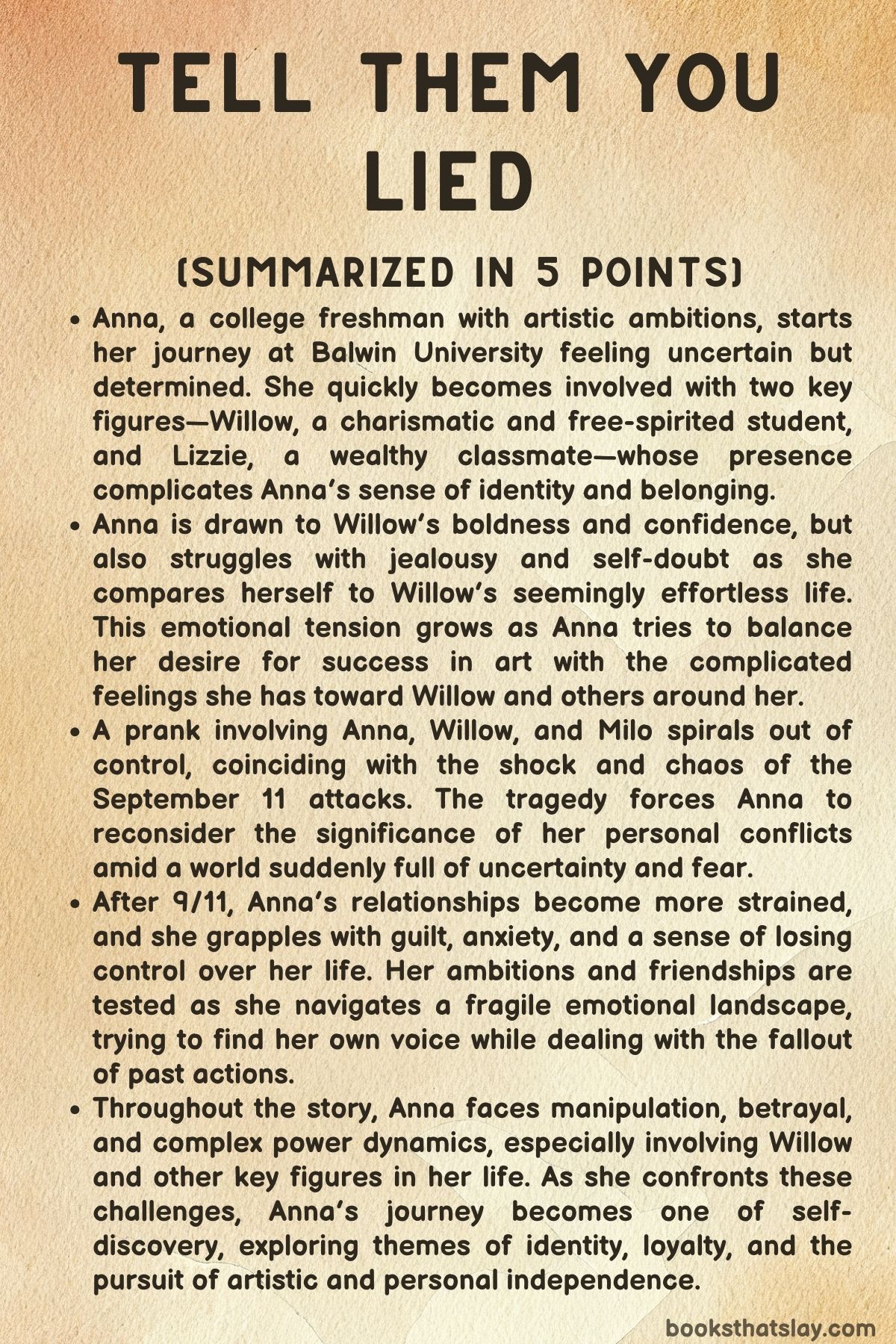Tell Them You Lied Summary, Characters and Themes
Tell Them You Lied by Laura Leffler is a deeply reflective novel that examines the complex dynamics of friendships, self-identity, and personal ambition. Set against the backdrop of Balwin University, the story follows Anna, a college freshman eager to establish herself as an artist.
The narrative delves into her complicated relationships with her friends, particularly Willow and Milo, as well as the internal struggle Anna faces in balancing her career aspirations with her emotional needs. Through a series of turbulent events, including the impact of the 9/11 tragedy, Anna is forced to confront the darker aspects of her friendships and the role of manipulation in her pursuit of success.
Summary
The story begins with Anna, a college freshman at Balwin University, eager to immerse herself in the world of art and create a name for herself. Anna’s reserved nature contrasts with the bold, carefree personality of Willow, a fellow student who quickly becomes her best friend.
While Anna aspires to be a respected artist, her self-esteem is often overshadowed by Willow’s charm and confidence, creating a complex emotional dynamic between the two. Anna finds herself both drawn to and envious of Willow, whose free-spirited nature seems to make everything in life come effortlessly.
As Anna and Willow’s friendship deepens, Anna becomes increasingly consumed by her feelings of inadequacy. She admires Willow’s effortless beauty and charisma, yet she begins to resent how easily Willow navigates life and relationships.
The two friends share moments of intimacy, but a growing sense of competition and jealousy complicates their bond. Anna often finds herself comparing her own achievements with Willow’s seemingly perfect life, which sparks self-doubt and feelings of unworthiness.
This emotional strain is intensified by the pressure Anna places on herself to succeed in the art world, where she dreams of being represented in galleries and achieving recognition.
The tension between Anna and Willow takes a darker turn when Anna, along with Milo, a classmate with whom she shares a complex history, conspires to prank Willow. The prank, which was initially meant to be a lighthearted revenge, spirals out of control and triggers a series of events that lead to greater emotional turmoil for Anna.
The prank serves as a catalyst for Anna’s internal conflict, highlighting her struggles with guilt, identity, and her desire for validation. These feelings intensify when the September 11 attacks unfold, forcing Anna to confront the absurdity of her previous concerns in the face of such a devastating global tragedy.
In the aftermath of the 9/11 attacks, Anna experiences a deep sense of disillusionment. Her focus on her art, relationships, and ambitions starts to feel trivial and insignificant in the wake of the catastrophe.
The event brings her closer to confronting the reality of her relationships with Willow, Milo, and others, revealing the cracks in their friendships. Anna’s guilt over her role in the prank, fear for Willow’s safety, and growing sense of anxiety about the future weigh heavily on her.
The climax of the story occurs when Anna confronts Willow, impulsively taking her coat, which further strains their relationship. This act sets off a series of emotional exchanges between the two, pushing their friendship to a breaking point.
Anna is faced with a difficult decision: whether to continue pursuing her artistic dreams while navigating the complexities of her emotional relationships, or to abandon everything in search of a new identity.
As the story progresses, Anna’s internal struggles lead her to a moment of self-reflection. She realizes that her desire for success in the art world has been motivated by her need for validation rather than a true passion for her craft.
Her journey becomes one of self-discovery, as she learns to navigate the tension between her ambition and her personal relationships. The novel examines how external events, like the September 11 attacks, can shape a person’s emotional development, forcing them to re-evaluate their goals and priorities.
Anna’s emotional journey culminates in a realization about her own identity and the role of friendship in shaping her sense of self. Throughout the story, Anna’s evolving relationship with Willow highlights her struggle with feelings of inferiority, jealousy, and the fear of being overshadowed.
As she learns to accept the complexities of her friendships, Anna comes to terms with the impact Willow has had on her life, both positive and negative.
The themes of self-doubt, artistic ambition, and the complexities of identity are explored in-depth as Anna navigates her personal growth. The novel concludes with Anna’s acceptance of her past and the realization that her future lies not in the shadow of others, but in her own strength and independence.
The story ultimately reflects the challenges of finding one’s voice in a world filled with competing influences and emotional turmoil.
In the end, Tell Them You Lied is a reflection on the fragility of human relationships and the impact of external events on personal development. Anna’s journey is one of navigating the tension between ambition and self-discovery, as she learns to accept both her strengths and vulnerabilities.
The novel illustrates how friendships can shape a person’s identity, but also how those relationships can be complicated by jealousy, manipulation, and personal insecurities.

Characters
Anna
Anna is the central character of Tell Them You Lied, a young woman navigating the challenging terrain of self-discovery, ambition, and complicated relationships. As a freshman at Balwin University, she is drawn to art and envisions herself becoming a recognized artist, yet her internal world is far from stable.
Anna’s character is defined by a deep-seated need for validation, which she constantly seeks through her relationships with others, particularly her best friend, Willow. Throughout the narrative, Anna is plagued by self-doubt and feelings of inadequacy, which are exacerbated by her comparisons to Willow, whose charisma and carefree nature make Anna feel inferior.
This dynamic becomes increasingly toxic, as Anna becomes obsessed with Willow, leading to jealousy and a sense of emotional chaos. Despite her ambition and creative drive, Anna’s vulnerability becomes clear as she struggles with the complexities of her emotions and her place in the world, especially when faced with the consequences of her actions, such as the prank involving Willow.
Her journey is one of painful self-reflection and growth, as she ultimately learns to understand her own motivations and reclaim agency over her life.
Willow
Willow is one of the most complex characters in Tell Them You Lied, representing both the allure of freedom and the destructive force of manipulation. A confident and free-spirited individual, Willow serves as both a friend and antagonist to Anna, shaping much of her emotional and artistic journey.
Her beauty and charisma make her a magnetic figure, but her actions reveal a more calculating and manipulative side. As the story progresses, Willow’s influence over Anna grows stronger, leading Anna into increasingly compromising situations, such as when she encourages Anna to use her beauty to gain power over men, including an uncomfortable encounter with Professor Kape.
At the heart of Willow’s character lies a deep emotional complexity; she uses her relationships to fulfill her own needs for control and revenge, especially in her dealings with Jon Potts. However, her actions often come at the expense of those around her, including Anna, whom she leads into dangerous emotional territory.
Willow’s eventual death in the 9/11 attacks adds a tragic layer to her character, as Anna grapples with the idea of her former friend as both a victim and an orchestrator of her own fate. Willow’s legacy, both as a muse and a manipulator, continues to haunt Anna throughout the narrative, forcing Anna to confront the darker side of friendship, power, and ambition.
Milo
Milo plays a pivotal role in Tell Them You Lied, primarily as a friend and sometimes accomplice to Anna. Their shared history provides a foundation for their interactions, but as the story unfolds, Milo’s presence becomes more complicated.
He is introduced as someone who, like Anna, is caught in the emotional turbulence of their college experience. Their relationship is strained by emotional undercurrents, including Anna’s growing envy and confusion over her own desires.
While he appears to be a supporting character, Milo’s actions, particularly during the prank with Willow, demonstrate the ways in which Anna’s relationships are intertwined with manipulation and emotional risk. His involvement in the events surrounding Willow’s disappearance adds to the tension in the narrative, and he becomes a symbol of the relationships Anna struggles to control.
Ultimately, Milo represents the complex web of emotional connections that shape Anna’s journey, offering moments of support while also contributing to her internal conflict.
Professor Kape
Professor Kape is a more ambiguous character in Tell Them You Lied, representing both authority and the power dynamics at play in Anna’s life. As a professor in the art department, Kape holds significant influence over Anna’s academic and artistic future.
However, his character is defined less by mentorship and more by manipulation. He becomes an unwitting catalyst in Anna’s emotional and sexual exploration when Willow encourages Anna to assert power over him in an encounter that leaves her feeling empty and disillusioned.
Kape’s later involvement in the story, particularly his obsession with Willow’s photographs, reveals his darker side, where his desperation for artistic success leads him to take drastic measures, including attempting to reclaim the photographs at all costs. His eventual confrontation with Anna, which leads to his death, highlights the dangerous consequences of the power struggles and manipulations that characterize Anna’s world.
Kape’s role in the narrative serves as a reminder of the blurred lines between artistic integrity, personal boundaries, and the pursuit of success in a world dominated by authority figures.
Lizzie
Lizzie’s role in Tell Them You Lied is one of a peripheral yet significant character, whose relationships with Anna and Willow help shape the dynamics of the group. Lizzie is wealthy and somewhat naive, offering a stark contrast to the more complex and manipulative nature of Willow.
Despite her superficial qualities, Lizzie plays a crucial role in the emotional tension between the characters. Her interactions with Anna and Willow often serve as a mirror to Anna’s own insecurities and desires for validation.
Lizzie’s involvement in the events surrounding Willow’s disappearance and her relationship with Anna highlight the ways in which different characters navigate their own needs for connection, power, and control. Although she is not as central as Anna or Willow, Lizzie’s presence underscores the diverse ways people cope with their emotions and the pressures of social and personal expectations.
Henry
Henry, Anna’s brother, plays a subtle yet important role in Tell Them You Lied, offering a counterbalance to the emotional chaos surrounding Anna’s relationships with her peers. Henry suffers from epilepsy, which creates a sense of responsibility for Anna, as she feels the weight of caring for him while navigating her own identity and desires.
His presence in the narrative brings an undercurrent of guilt for Anna, as she struggles with her artistic aspirations while also trying to reconcile her role as a caregiver. The strained relationship with her family, particularly with her mother, adds another layer of emotional complexity to Anna’s character, amplifying her feelings of isolation and disconnection.
Henry’s communication, particularly through his troubling emails, serves as a catalyst for Anna to confront her own emotions and choices, making him a key, though often overlooked, influence on her journey.
Themes
The Struggle for Identity and Self-Discovery
Throughout the narrative of Tell Them You Lied, Anna’s journey revolves around her internal struggle to find a sense of identity amidst the complexities of her relationships and ambitions. As a freshman at Baldwin University, Anna is caught between her desire to carve out a name for herself as an artist and the influence of those around her, especially Willow, who embodies everything Anna both admires and resents.
Anna’s early years are defined by her envy and admiration for Willow, whose confidence and apparent ease with life contrast sharply with Anna’s more reserved and uncertain nature. This juxtaposition becomes a key driver of Anna’s personal growth, as she navigates the tension between wanting to fit in and feeling inadequate.
The relationship with Willow represents a mirror in which Anna constantly compares herself, leading to feelings of jealousy, self-doubt, and confusion. Over time, as Anna becomes more entangled in Willow’s life and the superficial aspects of her success, she begins to question her own worth, not only as an artist but as a person.
The complex dynamics in her relationships, especially with Willow and Milo, force Anna to confront the parts of herself that she has neglected or been too afraid to explore. Her journey toward self-discovery is fraught with emotional turmoil, but it is also ultimately about reclaiming her agency, recognizing her strength, and understanding the impact of her choices on her identity.
Ambition and Artistic Success
The theme of ambition and the pursuit of artistic success is central to Anna’s story. At the beginning of Tell Them You Lied, Anna is driven by a clear vision of achieving recognition in the art world.
She dreams of being represented in galleries and achieving artistic validation, which serves as both a motivating force and a source of deep insecurity. However, Anna’s ambitions are complicated by her relationships, particularly with Willow, who seems to embody the very success Anna aspires to.
Willow’s carefree attitude and magnetic charm make Anna feel inadequate and overshadowed, causing her to struggle with feelings of inferiority. The tension between Anna’s desire to succeed and the reality of her own perceived shortcomings creates a profound internal conflict.
As she becomes more obsessed with Willow’s success, Anna’s journey becomes less about artistic expression and more about seeking external validation. The pressure to succeed as an artist, along with the manipulation and influence of those around her, forces Anna to confront the darker side of ambition—how it can sometimes lead to self-doubt, exploitation, and emotional compromise.
This theme of ambition highlights the fine line between genuine artistic passion and the desperate need for recognition, and the narrative suggests that true artistic success cannot be separated from personal integrity and self-awareness.
Friendship, Betrayal, and Emotional Manipulation
One of the most complex and deeply explored themes in Tell Them You Lied is the nature of friendship, particularly the toxic and manipulative dynamics that develop between Anna and Willow. The friendship begins with Anna’s admiration for Willow’s confidence and free-spirited nature, but as their relationship deepens, it becomes clear that Willow’s influence on Anna is not entirely positive.
Willow’s manipulative behavior, coupled with Anna’s growing emotional dependence, creates a cycle of control, emotional vulnerability, and betrayal. Anna’s desire for connection, acceptance, and validation from Willow blinds her to the destructive aspects of their relationship.
Willow, in turn, uses Anna’s insecurities to her advantage, pushing Anna into compromising situations that undermine her sense of self-worth. The complex nature of their friendship is marked by both emotional highs and devastating lows, as Anna feels both drawn to and repelled by Willow’s behavior.
The manipulation becomes especially evident in Anna’s interactions with other men, such as Professor Kape and Jon Potts, where she is encouraged by Willow to use her beauty and charm as tools for control and power. However, this false sense of empowerment ultimately leaves Anna feeling empty and used, as she realizes that her connection with Willow was built on a foundation of manipulation rather than genuine friendship.
As Anna grows, she is forced to confront the betrayal and emotional damage caused by Willow, but she also recognizes her own complicity in allowing herself to be manipulated. This theme underscores the complexities of friendships that blur the lines between love, loyalty, and exploitation, and it highlights the emotional toll of relying on others for validation rather than developing one’s own sense of self-worth.
Guilt, Loss, and Grief
Tell Them You Lied is also deeply concerned with the themes of guilt, loss, and grief, particularly in the aftermath of the September 11 attacks. The narrative takes a pivotal turn when Anna is forced to confront the reality of Willow’s disappearance, and her emotional turmoil intensifies as she grapples with the uncertainty of Willow’s fate.
The tragedy of 9/11 serves as a backdrop to Anna’s personal crisis, forcing her to put her own problems in perspective as she experiences a shift in priorities. The weight of the attacks magnifies Anna’s feelings of guilt and helplessness, as she begins to reflect on her role in the prank involving Willow, and the potential consequences of her actions.
The larger tragedy of the day provides a painful contrast to Anna’s personal struggles, making her internal conflicts feel trivial in the face of such immense loss. However, the impact of Willow’s death on Anna is profound, as she is left to grapple with the complicated emotions of admiration, jealousy, and guilt that defined their relationship.
The emotional weight of Willow’s death forces Anna to reflect on her own life, her choices, and the ways in which she has allowed herself to be defined by external influences rather than her own authentic desires. The theme of grief is also explored through Anna’s strained relationships with her family, particularly her brother Henry, whose struggles with epilepsy serve as another source of emotional complexity for Anna.
As she navigates the emotional landscape of grief and loss, Anna begins to understand the importance of confronting her past and accepting the emotional baggage that comes with it, in order to move forward and embrace a more self-defined future.
Power Dynamics and Manipulation
A recurring theme in Tell Them You Lied is the exploration of power dynamics and emotional manipulation, particularly as they manifest in Anna’s relationships with others. At the heart of the narrative is Anna’s complex relationship with Willow, whose manipulation of Anna is a constant source of tension.
From the beginning, Willow encourages Anna to use her beauty and charm as tools to gain influence and control over others, especially men. This dynamic is most evident in the way Willow persuades Anna to engage in a sexual encounter with Professor Kape, an act that Anna reluctantly agrees to in order to assert some form of power and control over her situation.
However, this perceived power is quickly revealed to be an illusion, leaving Anna feeling empty and betrayed. As the story progresses, the power struggles between Anna and Willow become more pronounced, with Anna increasingly realizing the extent to which she has been manipulated.
The manipulative behavior is not confined to Willow alone, as other characters, such as Milo and Professor Kape, also play pivotal roles in Anna’s emotional and artistic development. The constant shifting of power dynamics leaves Anna feeling confused and unsure of where she stands in her relationships.
This theme also explores the ways in which individuals use manipulation as a means of coping with their own insecurities and desires, and it suggests that true empowerment can only be achieved by reclaiming personal agency and rejecting the toxic dynamics of control and manipulation that have defined Anna’s past relationships.


